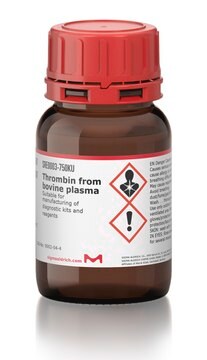T9326
Thrombin human
BioUltra, recombinant, expressed in HEK 293 cells, aqueous solution, ≥95% (SDS-PAGE)
Synonym(s):
Factor IIa
About This Item
recombinant
expressed in HEK 293 cells
Quality Level
product line
BioUltra
Assay
≥95% (SDS-PAGE)
form
aqueous solution
specific activity
≥2,000 units/mg protein
mol wt
37.4 kDa
UniProt accession no.
shipped in
dry ice
storage temp.
−70°C
Gene Information
human ... F2(2147)
Looking for similar products? Visit Product Comparison Guide
Related Categories
General description
Application
Unit Definition
Physical form
Storage Class Code
10 - Combustible liquids
WGK
WGK 1
Flash Point(F)
Not applicable
Flash Point(C)
Not applicable
Regulatory Listings
Regulatory Listings are mainly provided for chemical products. Only limited information can be provided here for non-chemical products. No entry means none of the components are listed. It is the user’s obligation to ensure the safe and legal use of the product.
JAN Code
T9326-150UN-PW:
T9326-VAR:
T9326-BULK:
T9326-150UN:
Certificates of Analysis (COA)
Search for Certificates of Analysis (COA) by entering the products Lot/Batch Number. Lot and Batch Numbers can be found on a product’s label following the words ‘Lot’ or ‘Batch’.
Already Own This Product?
Find documentation for the products that you have recently purchased in the Document Library.
Customers Also Viewed
Articles
Thrombin Factor IIa is an endolytic serine protease that selectively cleaves the Arg--Gly bonds of fibrinogen to form fibrin and release fibrinopeptides A and B.
Our team of scientists has experience in all areas of research including Life Science, Material Science, Chemical Synthesis, Chromatography, Analytical and many others.
Contact Technical Service

